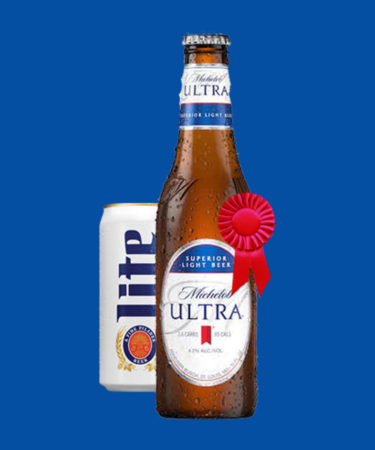Anheuser-Busch InBev (A-B) announced its first quarter results on a call with industry members on Tuesday. The brewing behemoth reported global revenue growth of 5.9 percent, or nearly $12.6 billion, in Q1 2019. Additionally, its worldwide volume increased 1.3 percent, and revenue per hectoliter grew 4.6 percent.
Another key takeaway: Michelob Ultra now accounts for 10 percent of A-B’s business. According to research firm IRI, it surpassed Budweiser as A-B’s second-best-selling brand at retail outlets. Budweiser dollar sales declined 4.4 percent, and Bud Light dollar sales declined 4.8 percent. Michelob Ultra dollar sales increased 15.5 percent to more than $568 million.
This also means Michelob Ultra surpasses Miller Lite as the third-largest beer brand in the U.S.
Mich Ultra is having a moment. Once the enemy of craft beer brands, the light-bodied lager (and others like it) is now being emulated by small and independent craft brewing companies targeting Michelob’s audience — healthy, active types who care about things like calories and carbohydrates. The light, bright craft lagers are a similar, slightly more flavorful alternative to macro brands.
Will low-cal, low-carb lagers from smaller operations compete with Michelob Ultra? It’s hard to tell. But I’ll keep drinking them and recommending them.
St. Louis Brewery Sold Back to Schlafly Family
The Saint Louis Brewery, producers of Schlafly Beer, is back in the hands of a Schlafly family member, David Schlafly, cousin of brewery co-founder Tom Schlafly. A new investor group lead by David Schlafly now controls 80 percent of the company, Brewbound reports. Tom Schlafly and co-founder Dan Kopman sold a 60 percent stake in the company to Sage Capital, a private equity firm, in 2012.
It’s an odd time to buy Schlafly back. Its beer sales declined 13 percent in 2016 and 2017, and declined again in 2018. But David Schlafly is no inexperienced buyer. Since initially investing in the brewery in 2012, he’s increased his stake gradually, eventually being appointed to the board of directors. Oh, and he’s a commercial real estate developer, and owner of the Schlafly Corporation.
I suppose it’s nice to see the company returning to the family, but I suspect there are economic motives beyond making great beer. We don’t know what they are just yet, but this man has a plan.
Celis Brewery Falls on Hard Times, Again
Celis Brewery, a family brewing company resurrected by the late Pierre Celis’s daughter Christine Celis, in 2017, is rumored to be on hard times. Sources told Brewbound the Austin, Tex., brewery may sell to an investor group, or file for bankruptcy as early as this Friday.
Allegedly, sales of Celis beer have slowed, contract brewing labels produced by Celis have been “in limbo,” and several executives have recently departed the company.
This is sad but, unfortunately, it’s not unique. Although many beer industry members have been inspired by Celis’s story and facility, it may follow in the footsteps of other struggling breweries, such as Green Flash and Smuttynose, both of which sold to investment firms last year.
The craft beer market is a crowded place, and these days, good beer and intentions are not always enough to stay afloat. I hope there’s a place for Celis in the industry, but if not, I’ll chalk it up to evolution.
